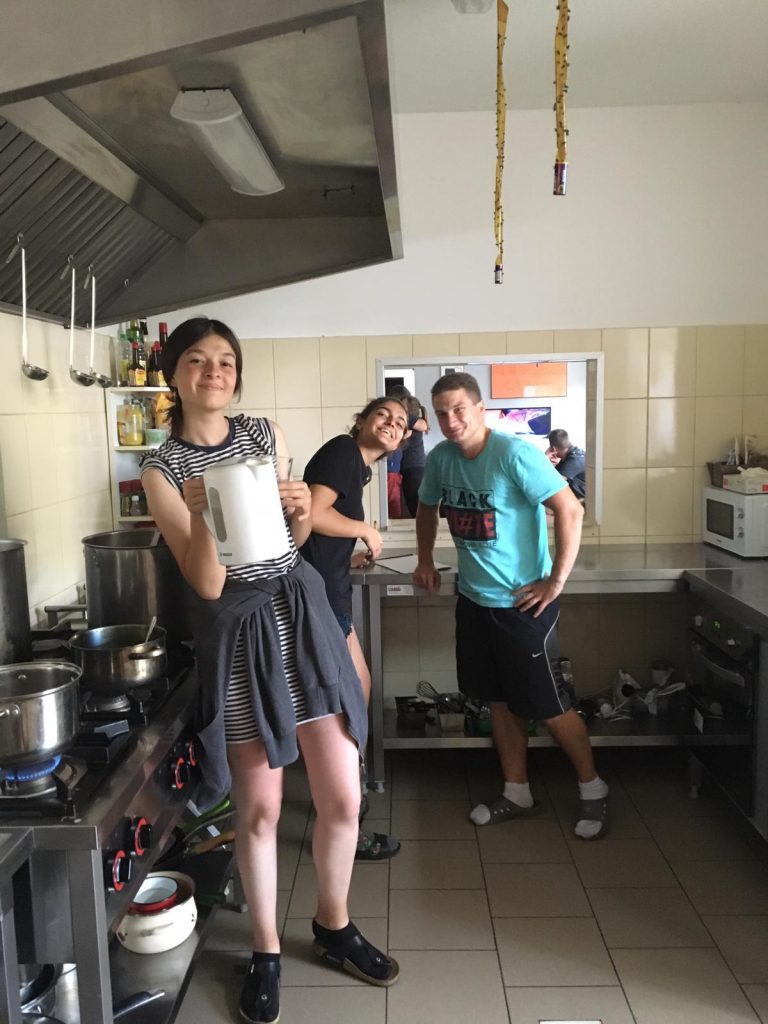Mutual integration in Monar Wyszków
Workcamp
Written by Eliane Preiswerk
Have you ever been greeted by a big applause upon arrival at the workcamp? This is how the community of Monar welcomed our little group of volunteers to their summer camp in Bachotek. Dancing around the campfire to the sounds of Disco Polo, we celebrated the start of this special fortnight.
The following days went by swiftly with swimming in the lake, kayaking, and enjoying Polish summer.
Soon it was time to go back to the community center in Wyszków, around 60 km from Warsaw (Poland). Here we got to join in the everyday life of the community, with its strict schedule: going for a run in the morning, breakfast, morning meeting, work, second breakfast, work, lunch, integration time, dinner, evening meeting.
Especially important are the meetings in the morning and evening: in the morning, the Monar philosophy is recited together, the schedule for the day and the plan for work are presented, the news and a quote for the day are read, and everybody shares how they are feeling that day. The meeting ends with wishing each other a nice day and giving hugs. In the evening it’s time to say thanks. Everybody says how their day was, and says thanks to the people they had a special moment with, or to the kitchen team for the delicious meal.
The afternoon programme activity “integration” means time spent together with a special topic or activity, like the volunteers presenting their countries. For example, we looked at Catalonian Christmas traditions or learnt to dance traditional Turkish dances, and learnt about SCI and its history. Over all these activities, one could easily forget that Monar is not some kind of summer camp for young people, but a rehabilitation centre for people with drug addiction trying to learn how to live a drug-free life. And then again, in other moments, reality became apparent again. When a new person came to join the community, everybody introduced themselves: “My name is …, I am addicted to …, I have been here for 3 months”.
Another, more light-hearted, kind of urgent meeting took place on a birthday, when everybody was collected under the pretence of discussing an incident and collecting ideas for how to solve this problem – serving the birthday cake and singing „sto lat”.
As Polish has a reputation of being a difficult language, my initial worry was that communication would be difficult and hinder our integration into the community. This concern was quickly dispelled: as I learnt in this workcamp, communication is often possible without words, and if not, there was always somebody helping to translate. Despite the language barrier, friendships have grown.
Too soon it was already the last day, time to say „do widzenia”, and the last meeting to say thanks to everybody in this community for welcoming us and letting us be part of the community life.
A few days after, as I am writing this, I am still deeply impressed by the hospitality and the atmosphere in Wyszków. After all, the philosophy of the therapeutic community of Monar and SCI philosophy are very similar in a multitude of ways: we live together in the group and solve upcoming problems without regressing to violence.
The role of the community is important, it is a place where everybody’s voice is heard and respected. We don’t have to pretend to be someone else, neither the giant of our dreams nor the dwarf of our fears, we don’t need to hide ourselves behind a masquerade. We support each other in difficult moments and enjoy the beautiful moments together. Together, we can find the path to inner peace and to a new way of living.
I would like to end this article in the same fashion as in the last evening meeting: thank you to all the people in the Wyszków community for your hospitality, for your openness and for everything we could learn from you, thank you Marysia, our coordinator, for everything you did for us, and thank you to our volunteer group for this good time, and I hope we will all meet again!

You can still join!
Want to have your own volunteer experience for peace?
Read more Voices of Volunteers
